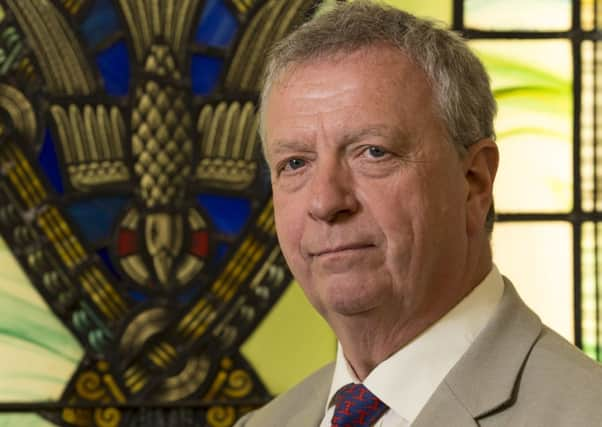Call for unity in Kirk over gay marriage


In a strongly worded address to the General Assembly as it closed in Edinburgh yesterday, the Moderator, the Rt Rev John Chalmers, appealed for unity and called on those who wanted to leave the Kirk over the issue to think again.
He also raised concerns about the falling number of people – young people in particular – entering the ministry.
Advertisement
Hide AdAdvertisement
Hide AdHis comments followed the General Assembly’s decision on Wednesday to move forward with controversial plans to allow the ordination of openly gay ministers in same-sex partnerships.
The issue was sparked in 2009, when openly gay minister the Rev Scott Rennie was appointed to Queen’s Cross Church in Aberdeen.
It has threatened to split the Kirk between traditionalists who object to the move as departing from “biblical truth” and revisionists who support it.
Mr Chalmers urged the Kirk to look outwards. He said: “A tide has to be turned because a generation of people out there are being invited to live a life of disbelief – if not unbelief.
“And there is no justification for that.
“This Church of ours has to stop its navel-gazing, get out from under subjects that no-one is actually talking about and get out there and capitalise on the fact that people still want purpose and faith in their lives. They just need it to be accessible, relevant, generous, forgiving.”
Highlighting a pressing area of concern for the Kirk, the Moderator pointed to “worrying facts” about the number of people entering the ministry, which it “cannot turn a blind eye to”.
He said: “A quarter of our charges do not have an inducted minister and we only have two ministers under the age of 30: when I was inducted, there were seven of us in my presbytery. Four times the number of ministers will retire in the next six years than we are likely to recruit in the same time-frame.”
The General Assembly agreed to push forward with a proposal passed last year to create “a mixed economy” for the Church on the issue of gay clergy.
Advertisement
Hide AdAdvertisement
Hide AdIt has asserted its traditional stance on marriage of “one man, one woman” but allows liberal congregations to “opt out” and appoint an openly gay minister if they wish to.
The move was challenged by evangelical traditionalists during Wednesday’s day-long debate on the issue, which saw both its theological and legal basis questioned, and an attempt by Edinburgh evangelical minister the Rev Jeremy Middleton to strike out the “opt-out” clause.
His attempt was defeated by 369 votes to 189.
The decision will now go out to presbyteries to accept or reject, before potentially being made church law at the General Assembly next summer.
Since the controversy first broke, 13 ministers and hundreds of members have quit over the issue, and the Moderator said that for the past two years he had “patiently absorbed much of the rancour by a very few who have set out their stall for leaving the Church of Scotland” in protest at the decision.
Telling the Kirk it was “time now for us all to pull together”, he made a direct appeal yesterday to those who were still considering going after this week’s General Assembly.
He said: “Ask those who want to leave to let you know when they have settled in the perfect church and we will all come round and inspect its credentials. Meantime, we have to get on with being as good as we can be, even if it’s not perfect.”
Describing the week as “momentous” for the Kirk, Mr Chalmers said he hoped the decision on gay ministers would pave the way for a “period of Church life” when the issue of human sexuality would be “set to one side” and allow it to “focus on the urgent business of mission, ministry and service to the people of Scotland”.
His speech also touched on the General Assembly’s debate on Scotland’s independence referendum, stating that they had made an “important contribution” to the discussion about the country’s future.
He said it positioned the Kirk to be “a relevant force for helping to unify the people of Scotland, helping to heal hurts that may be left behind in a post-referendum Scotland.”